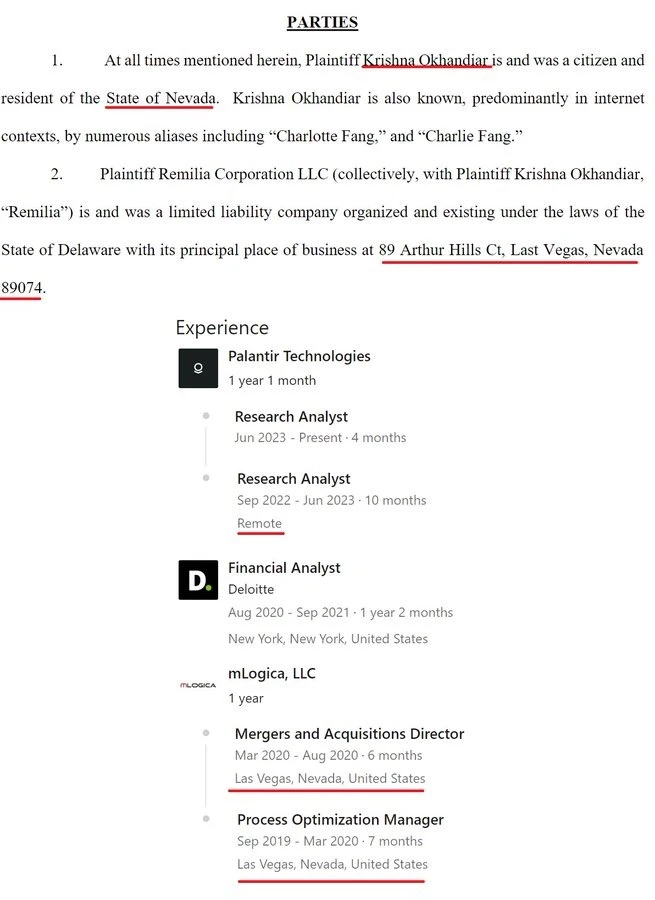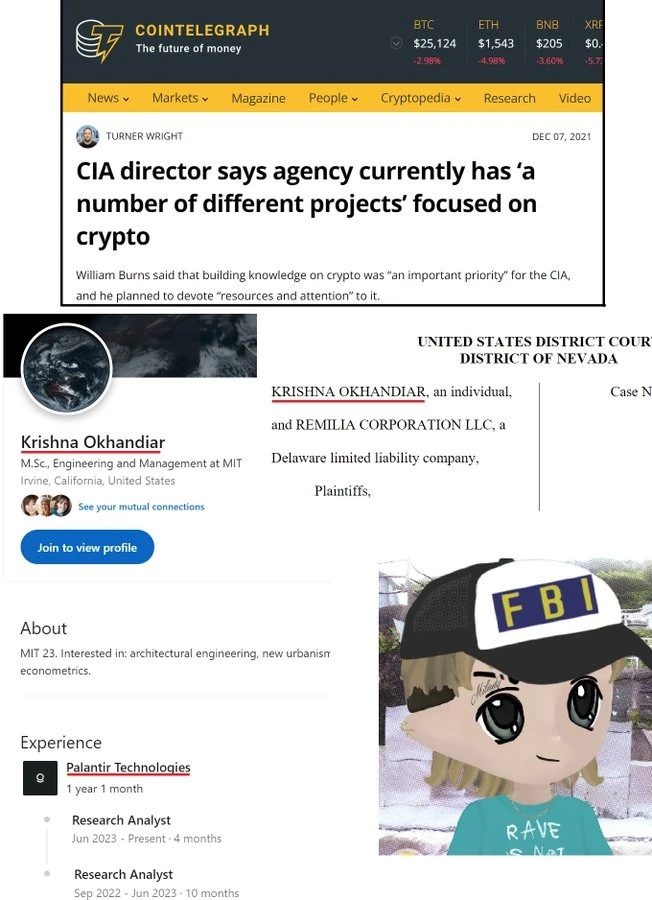Milady Civil War Mist, the founder or indirectly served American intelligence agencies
*Written by: 0xAyA, * Odaily Planet Daily
Edited by: Hao Fangzhou
The NFT market has been sluggish for a long time. The few "families" that insist on using NFTs as social media avatars are left with only CryptoPunks, BAYC series, Azuki, Milady…
Wait, Milady???
In the Crypto world, Milady has always been regarded as the epitome of rebellious spirit, Shamate, performance art, and obsession, with its "evil" culture and abstract spirit of deconstruction vividly reflecting the characteristics of a small circle. (See "Milady Before Musk's Call: The 'Internet Psychopath' Taken to the Extreme")
Yet, such a project, politically indifferent to the external world, is experiencing "internal turmoil" this week.
Ultimately, is it a matter of money and title?
On the evening of September 11, Milady founder Charlotte Fang stated on the X platform that a developer misappropriated approximately $1 million from the Milady official project Bonkler treasury, and this developer also seized the code repository, demanding the team hand over more funds and NFT reserves. Currently, the X accounts of miladymaker and remilionaire are under the control of this developer.
Charlotte stated that relevant members have been identified, and they will be held accountable to the fullest extent of the law. The minting of Bonkler NFTs has been temporarily halted, and the Bonkler community treasury, contracts, and NFTs are safe. Other series of NFTs under Milady's parent company Remilia have not been affected for the time being.
However, a few hours later, another founder of Milady, Remilia's creative director and artist Sprite Bonkler? (Elf) tweeted: "Charlotte is spreading a false narrative unrelated to reality, trying to preemptively disclose his own misconduct and misappropriation of Remilia funds before legal scrutiny and public exposure. Three weeks ago, we wrote to Charles, trying to get him to acknowledge us as co-founders, provide us with the equity we deserve in the company, and demand he return all funds removed from the treasury. In response to our letter, after Charles's lawyer asked us not to publicly express our concerns, Charles filed a lawsuit, incorrectly labeling us as 'independent contractors' and 'terrorists.' When Charles made these claims, he failed to provide any contracts and did not attach the numerous communications we received from him, which support our claims and contradict his own. We welcome the opportunity to resolve this dispute in court."
In response, Charlotte stated: "Remilia has no co-founders. From the beginning, I have held separate control over the funds and operations. Before the establishment of the LLC, I solely controlled the assets used to fund Remilia's operations, and they directly reached agreements with me and were compensated from the funds I controlled. The core team working on Milady and Remilio receives revenue sharing and accepts positions in the company to continue working, and these individuals never negotiated equity at that time or any time. This lawsuit arose from the seizure of company property before demanding the transfer of all stablecoins and NFT treasury of Remilia to an entity controlled by five parties. They threatened to expose us first and refused to comply with the cease and desist order or participate in private arbitration. My action to freeze Bonkler was to protect the community's interests. The developer has no right to retain ownership of the Bonkler contract. Jimbo did receive a letter of intent for co-founders but rejected it at that time."
Both sides hold their ground; what is the real background?
It is understood that the Milady series was initially designed by "Elf," and later Charlotte joined and established Remilia, with the former still responsible for art and design, while the latter handles marketing, publicity, community building, and other tasks.
Beyond money and control, the mysterious real identity
Considering the troubles Charlotte has previously brought to the community, this dispute seems somewhat expected.
Charlotte's true identity had already been "unboxed" by community members, and in the copy of the lawsuit issued by Charlotte, this name can indeed be found—Krishna Okhandiarz, linked to the parent company Remilia Corporation LLC.
Digging further, WazzCrypto on X provided his inference: not only can a namesake be found on LinkedIn, but various information—rare name, work experience in Nevada, IT background, remote work, etc.—can correspond one by one, essentially locking in the overlap of "the two." According to employment history, Krishna Okhandiarz worked at a company called Palantir.

What does Palantir do? An article published by Forbes in August 2013 stated:
The biggest problem facing Palantir's business may be: "It helps clients see too much." After NSA whistleblower Edward Snowden revealed the agency's massive surveillance, Palantir's tools have become the greatest fear of privacy advocates regarding data mining technology—Google-level products directly applied to government espionage.
In the modern world, it is not easy for someone like Karp to become a renegade. Conversely, if tools like Palantir are in the hands of the government, it may be even harder for the rest of us to engage in deviant behavior.
Wikipedia describes this company as follows:
Palantir Technologies is a publicly traded American company specializing in big data analytics. Headquartered in Denver, Colorado, it was founded in 2003 by Peter Thiel, Nathan Gettings, Joe Lonsdale, Stephen Cohen, and Alex Karp. The company's name comes from "The Lord of the Rings," meaning "seeing stone," described as an indestructible crystal ball used for communication and viewing events in other parts of the world.
As of 2013, Palantir's clients included at least twelve groups within the U.S. government, including the CIA, Department of Homeland Security, FBI, Centers for Disease Control and Prevention, Marine Corps, Air Force, Special Operations Command, Recovery Accountability and Transparency Board, and the National Center for Missing and Exploited Children. However, at that time, the U.S. Army continued to use its own data analysis tools. Additionally, according to TechCrunch, U.S. intelligence agencies such as the CIA and FBI were first associated with Palantir software because their databases had previously been "isolated."

Thus, performance art shines into reality—founders of a non-mainstream community indirectly help the government "control or arrest" the non-mainstream, creating a surreal sense of "the enemy is in the honjin."
What do people think? What happens next?
Returning to the conflicting narratives of the two founders, industry insiders and community members have expressed their views on the team division, profit distribution, and brand positioning of NFT projects represented by Milady.
@vectorized.eth, who leads protocols like Sound.xyz and erc721a.org, believes, "Compensation can be a very sensitive topic, especially in this field. It is difficult to judge whether sufficient compensation has been obtained from the lawsuit before we have some concrete numbers. Artists, marketers, and developers all play key roles in the success of the project. However, it is important to understand that the company must strike a balance between profit sharing and reinvestment in business expansion. So it is not as simple as evenly distributing profits among all core members. If compensation is deemed too low, employees should seek other opportunities unless there are non-compete clauses in their contracts. If the competition is unfair, do not sabotage. Just exit."
@_gabrielShapir 0 stated, "From a legal perspective, Charlotte is very persuasive; he may win. Charlotte is a genius in community (cult) building and aesthetics and has driven the development of this field in many ways. But now the consensus has disappeared; Milady once stood against the narrative of 'BAYC receiving VC investment,' but now it has been exposed as a commercially supported company. If Milady wants to survive, it must not betray the propaganda of cyber anarchism and create a future unbound by corporate or individual worship."
A harsher reality is that an NFT project torn apart by infighting among the founding team is like a pile of loose sand, easily scattered by the wind.
From the short-term market feedback, the Blur market shows that the floor price of Milady is currently reported at 2.4121 ETH, down 15.31% in a single day and down 27.27% over the past week.
Even if the team shakes hands and makes peace afterward, can the spiritual core of Milady, once scattered, be gathered again?












